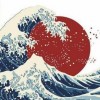日本語訳お願いします。
He counted how long he could hold his breath. Each day he improved his time. Even back at home he timed himself by the clock, and was proud to find he could hold his breath for two minutes. The authority of the clock brought close the adventure that was so important to him.
The day after tomorrow, his mother reminded him casually one morning, they must go home. He swam straight out to the rock and looked down into the water. This was the moment when he would try. If he did not do it now, he never would. He filled his lungs, started to count, and dived to the bottom.
He was soon inside the dark, narrow hole. The water pushed him up against the roof. The roof was sharp and hurt his back. He pulled himself along with his hands — fast, fast. His head knocked against something; a sharp pain dizzied him. He counted: one hundred… one hundred and fifteen. The hole had widened! He gave himself a kick forward and swam as fast as he could. He lost track of time and said one hundred and fifteen to himself again. Then he saw light. Victory filled him. His hands, reaching forward, met nothing; and his feet propelled him out into the open sea. He floated to the surface, pulled himself up onto the rock and lay face down, catching his breath. After a time he felt better and sat up. Then he swam to shore and climbed slowly up the path to the house.
His mother came to meet him, smiling.
“Have a nice time?” she asked.
“Oh, yes, thank you,” he said.
“How did you cut your head?”
“Oh, I just cut it.”
They sat down to lunch together.
“Mom,” he said, “I can hold my breath for two minutes — three minutes.”
“Can you, darling?” she said. “Well, you shouldn’t overdo it. You look a bit pale. I don’t think you ought to swim any more today.”
She was ready for a battle of wills, but he gave in at once. It was no longer of the least importance to go to the bay.
















補足
ありがとうございます。 ここで使われてるto be past は日本語でどう訳してますか?? ”過ぎ去った”という意味合いですか? なんどもすみませんが、良かったらお願い致します。